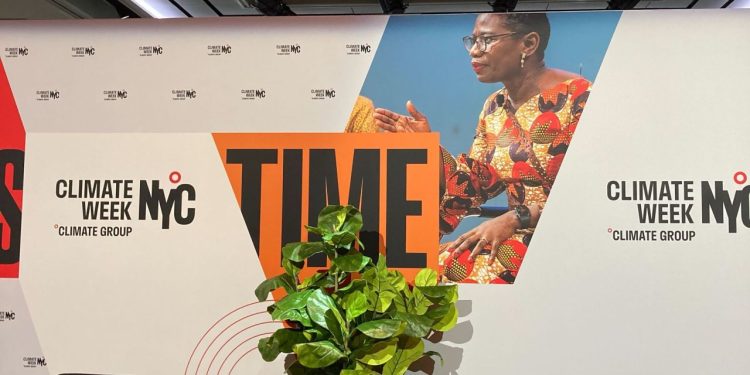New study finds ten cities alone across three continents, from Bogotá (Colombia) and Amman (Jordan) to Freetown (Sierra Leone) and Karachi (Pakistan) should prepare for significant climate migration in coming years
Sierra Leone Telegraph: 18 September 2024:
The groundbreaking new research has set out the scale and impact of climate migration to cities across Africa, South America and southern Asia over the next quarter of a century.
The findings show that up to eight million people are likely to move to the ten cities identified in the report by 2050 as a result of climate change alone, exacerbating existing trends of migration towards cities.
The first-of-its-kind analysis from C40 and the Mayors Migration Council studied the projected impact climate change on internal migration for ten cities across three continents: Bogota (Colombia), Curitiba, São Paulo, Rio de Janeiro, Salvador (Brazil), Amman (Jordan), Karachi (Pakistan), Dhaka (Bangladesh), Accra (Ghana) and Freetown (Sierra Leone). Despite their vast geographic and demographic differences, all ten will need to prepare to receive significant inward climate migration over the next 25 years.
“It shouldn’t just be cities in the Global South leading the charge—global cooperation is essential.” – C40 Co-Chair, MMC Leadership Board Member and Mayor of Freetown, Yvonne Aki Sawyerr
While all cities in the research are projected to receive climate migrants, the intensity will vary in line with projected increases in global warming. In a scenario in which the world fails to meet the 2015 Paris Agreement targets of keeping global warming under 1.5C above pre-industrial levels:
- Karachi could receive as many as 2.3 million domestic climate migrants by 2050,
- Cities like Bogotá, Rio de Janeiro and Karachi could see a threefold increase in the number of climate migrants compared to scenarios where Paris Agreement targets are met
- Many cities including Freetown and Amman – as primary economic hubs for the country – are expected to receive at least half of all people moving due to climate change within the country
| City | Current Population | Potential internal climate migrants by 2050 if Paris Agreement 1.5C benchmark is surpassed |
| Accra (Ghana) | 3m | 339k |
| Amman (Jordan) | 3.5m | 554k |
| Bogotá (Colombia) | 8m | 598k |
| Curitiba (Brazil) | 2m | 191k |
| Dhaka (Bangladesh) | 12m | 3.07m |
| Freetown (Sierra Leone) | 1.3m | 269k |
| Karachi (Pakistan) | 15.5m | 2.4m |
| Rio de Janeiro (Brazil) | 6.6m | 294k |
| Salvador (Brazil) | 2.4m | 198k |
| São Paulo (Brazil) | 11.8m | 618k |
Source: Future Urban Landscapes: Climate Migration Projections in Cities
This research has also, for the first time, looked into the type of climate impacts that will drive migrants to cities. These include reduced crop yields, sea levels rising and extreme weather events such as floods and wildfires. (Photo below: Heavy rains in Freetown, bring destruction).
Researchers found that in every country, multiple, overlapping climate factors which put homes and livelihoods at risk are the main drivers of climate migration to cities.
800 million jobs are at risk globally due to the impacts of climate change and unplanned green transitions. Globally, migrants are also playing an essential and under-recognised role today in cities and sectors that are critical to the green transition, including construction, waste management and transport, but face challenges accessing opportunities and decent jobs. Meanwhile, no country has the domestic workforce ready to support its green transition efforts (IOE).
Additional research to be published later this month by C40 Cities, Emerson Collective’s Climate Migration Council (CMC), and the Mayors Migration Council in a new policy brief, shows migrants will bring essential skills to these 10 cities, often in agriculture and primary industries that are key for adaptation, nature-based solutions and new urban bio-economies that many of the cities’ studied are already ramping up, as part of their climate action plans.
It highlights more than 30 examples of city-led actions to drive the creation of good green jobs for all – including migrants and refugees – while developing a green, diverse and inclusive workforce.
“Whether supporting green microenterprises in Freetown or integrating migrant waste workers into cooperatives in Accra, city leaders show what inclusive climate action looks like in practice. City leadership can turn climate migration from a crisis into an opportunity.” – Vittoria Zanuso, Executive Director of the Mayors Migration Council.
These findings clearly show that cities are central to managing new climate migration in a way that is beneficial to urban communities and economies and to transform global challenges into critical economic, environmental and social opportunities, but they need the right support and recognition to do so.
C40 Co-Chair, MMC Leadership Board Member, and Mayor of Freetown, Yvonne Aki Sawyerr said: “As Mayor of Freetown and in my roles as Co-Chair of C40 Cities member of the MMC Leadership Board, I am committed to draw attention to the critical issue of climate migration.
Between 2016 and 2021, 43 million children were displaced by extreme weather events worldwide, highlighting the urgent need to address climate migration, especially in the Global South. Yet, only 8 per cent of the USD $5 trillion required annually for urban climate action is available.
“It shouldn’t just be cities in the Global South leading the charge – global cooperation is essential. That’s why through my role, I will continue to work with cities worldwide to advocate for increased investment and support to protect Freetown’s communities and the many communities in developing countries that are adversely impacted by climate change”.
Mayor of Accra, Elizabeth Sackey said: “Accra, and cities across all of the Global South, are confronting the effects of the climate crisis whilst also welcoming displaced populations from across their countries, many without access to formal employment or status.
“Locally-led climate action, driven by local-level data and backed by sufficient climate finance, presents a key opportunity for cities to facilitate the inclusion of migrants while protecting all residents from climate impacts.”
Mayor of Milan, Giuseppe Sala said: “As cities face the climate crisis and support residents affected in various ways, mayors lead in fostering the conditions for a more inclusive and sustainable urban environment. This research highlights the urgency of our actions.
“In Milan we prioritise education and labour integration and we are expanding the efforts to create thousands of green jobs. Our commitment is clear: to protect the environment while ensuring everyone benefits from a just transition.”
Executive Director of C40 Cities Mark Watts, said: “At C40, we see the crucial role cities are playing in addressing climate migration and supporting vulnerable communities.
“The innovative efforts taken by cities highlights the leadership at the local level, from integrating informal workers to providing vital services for migrants.
“Cities are on the front lines of the climate crisis and are bearing the brunt, and are working together to help solve it. We need national governments to do the same, because this is a global issue that nations can’t simply isolate themselves from. This is also a human issue, a matter of livelihoods, so we can’t delay. We need decisive action now.”
Managing Director of Immigration at Emerson Collective and advisor to the Climate Migration Council, Marshall Fitz said: “Migrants bring skills, expertise, and an entrepreneurial mindset to the communities they settle in, particularly in sectors that are critical to the green transition, including agriculture, construction, waste management, and more.
“Cities that invest in the creation of good green jobs can accelerate their energy transition by ensuring migrants are able to access those opportunities. This research shows that by welcoming migrants and investing in skills training for all workers, we can meet a number of critical objectives: provide economic empowerment to workers, help meet the goals of the Paris Agreement, and build more resilient and inclusive cities for all.”
Executive Director of the Mayors Migration Council, Vittoria Zanuso said: “The World Bank projects climate change could displace over 200 million people by 2050, with most relocating within their own countries, often from rural to urban areas. Africa alone could see 85 million internal climate migrants.
“But while climate change is a crisis, the migration it causes doesn’t have to be. If managed effectively, it can help build stronger cities and benefit other marginalised communities. We’ve seen city leaders drive inclusive climate action through the Global Cities Fund for Migrants and Refugees—whether supporting green microenterprises in Freetown or integrating migrant waste workers into cooperatives in Accra.
“Today’s research with C40 Cities adds to this growing body of evidence, showing the potential of city leadership to turn climate migration from a crisis into an opportunity. Now, it’s time to scale these solutions and build a global movement that redefines what’s possible.”













